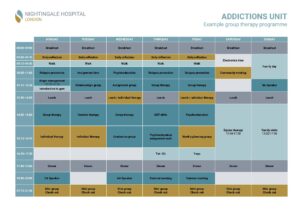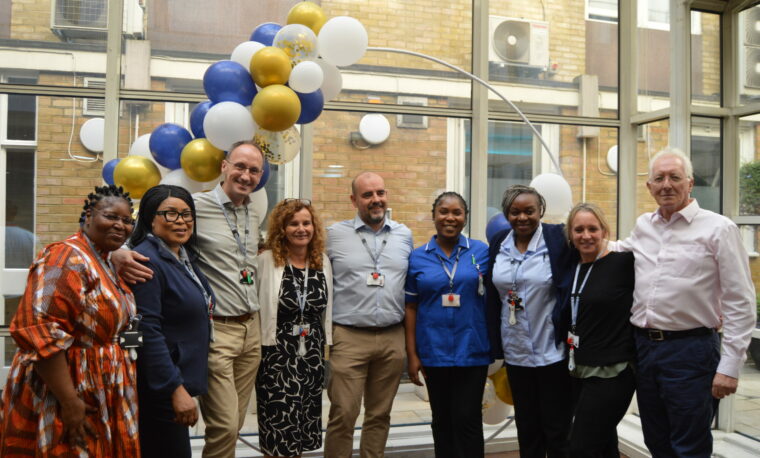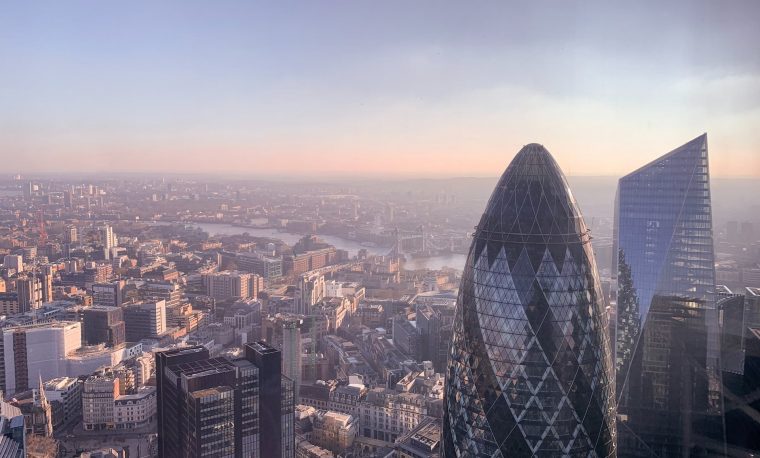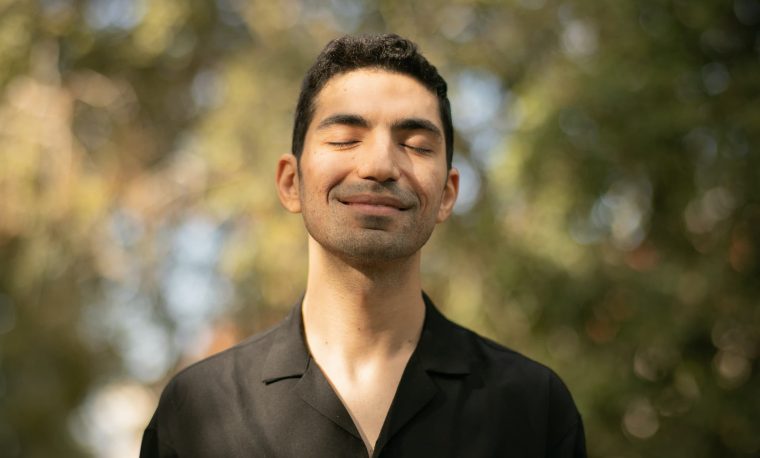28-day addiction treatment programme
The 28-day addiction treatment programme is an intensive inpatient programme for adults experiencing addiction. It is suitable for those who have a dependency on alcohol or drugs (including amphetamine, benzodiazepine, cannabis, cocaine, codeine, ecstasy, heroin, ketamine, inhalant, opiates, and prescription drugs): or for behavioural addictions (such as gambling, sex and love and technology). Our expert addictions treatment team are also skilled in supporting patients with dual diagnosis.
The addiction treatment programme at Nightingale Hospital has a strong emphasis on relapse prevention, psychoeducation, group therapy, cognitive behavioural therapy (CBT), implementation of positive coping strategies and family involvement in treatment. It offers an introduction to mutual aid groups such as AA (Alcoholics Anonymous), NA (Narcotics Anonymous) and CA (Cocaine Anonymous).
Our caring and experienced team foster a treatment community, with the aim to give you a strong foundation in abstinence-based recovery, and address addictive behaviours. The patient-focused therapeutic journey will develop your knowledge, personal resources and tools to sustain healthier ways of living life free from active addiction.
Programme inclusions
Addiction treatment at Nightingale Hospital takes an integrated approach to supporting individuals on their journey to recovery. We recognise that addiction is a complex and multifaceted condition that requires individualised and integrated care. The 28-day addiction treatment programme is based on a comprehensive therapeutic framework of biopsychosocial care and evidence-based therapies with the support of some of the UK’s leading addiction specialists to help you live a life free from active addiction.
Our 28-day addiction treatment programme consists of:
- Medically-assisted detox to safely manage the acute symptoms of withdrawal associated with early drug or alcohol abstinence, if required
- Medical assessment on admission
- 24/7 care from specialist nurses, doctors and therapists
- Comprehensive group therapy programme, taking place 7 days per week
- Weekly one-to-one therapy sessions with your key therapist
- Twice weekly consultant psychiatrist reviews
- Weekly meetings with your multidisciplinary team to discuss your physical and psychological progress, and also to discuss the discharge process and your ongoing treatment plan
- Attendance of on-site fellowship groups such as AA (Alcoholics Anonymous), NA (Narcotics Anonymous) and CA (Cocaine Anonymous) exclusively for addiction patients to enhance the sense of community and support
- Monthly family day and weekly family support group
- Free weekly aftercare group for one-year post discharge
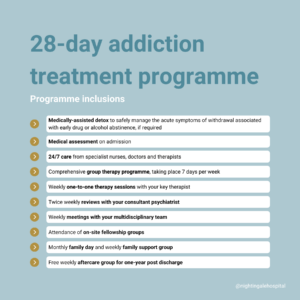
Our caring and experienced team foster a treatment community, with the aim to give you a strong foundation in abstinence-based recovery, and to address addictive behaviours. The therapeutic journey will develop your knowledge, personal resources and tools to sustain healthier ways of living life free from active addiction.
The existence of strict addiction unit guidelines, together with a caring and multidisciplinary team ensure the necessary boundaries for safe and effective treatment. All patients are tested frequently and randomly for alcohol and drugs, using a variety of means during treatment, particularly after periods of unescorted leave while in treatment.
We are an accredited service by the British Association for Counselling and Psychotherapy (BACP).
Example timetable of the 28-day addiction treatment programme
The below timetable provides an overview of what a week in the 28-day addiction treatment programme might look like. Please note, this timetable does not include your one-to-one session with your key therapies, reviews with your consultant psychiatrist and weekly multidisciplinary team reviews. This timetable is subject to change.
Free telephone consultation
We offer a free telephone consultation to determine if addiction treatment would be right for you, or a loved one. Complete the form below and an addiction specialist will be in touch to arrange a telephone appointment.
Addictions treatment telephone consultation
We offer a free telephone consultation to determine if addictions treatment would be right for you, or a loved one. Complete the form below and a member of our expert addictions team will be in touch to arrange an appointment.
Book your consultation
Programme overview
The 28-day addiction treatment rehabilitation programme generally consists of three distinct phases: detox, therapy and aftercare.
Addiction detox
Before you begin your 28-day programme, you might undergo a medically-assisted detox. The purpose of this medically supervised detox is to remove toxic substances from your body, whilst helping to manage withdrawal symptoms throughout this process. This detox will be undertaken on the specialist addiction ward at the hospital, under the care of a Nightingale Hospital consultant psychiatrist. Here, you will receive 24-hour care from specialist nurses, doctors and therapists who are experienced in safely supporting patients withdrawing from substances. To help manage any withdrawal symptoms, you may be given appropriately controlled medication throughout this detox.
Addiction therapy
Once you are medically stable through the detox process, then you begin to address the underlying factors that contributed to your addiction. It is through such therapeutic work that you may begin the healing process and your recovery journey.
The core therapeutic programme takes place 7-days a week. In addition to the comprehensive therapeutic programme, all patients receive weekly one-to-one therapy. All patients are under the care of an experienced nursing team, a ward doctor, and a consultant psychiatrist, with whom they have direct contact at least two times a week.
By combining these diverse therapies and modalities, our programme addresses the complex interplay of biological, psychological, social, and environmental factors underlying addiction. Our team will create a treatment plan which is individualised to meet the needs and preferences of you, empowering you to live a life free from active addiction.
- Addiction is often said to be a family disease. It affects not only the person with the problem, but also overturns the lives of those who love and care for the individual suffering. Those nearest to the sufferer often find themselves living in turmoil and chaos. Many loved ones are left feeling exhausted and powerless, after experiencing a range of emotions that commonly include despair, guilt, anger and frustration. Addiction affects families in many complex ways and family intervention and family therapy is often required. Family members and friends are included in treatment at Nightingale Hospital, wherever appropriate. With the agreement of patients, families are invited to attend a monthly family day and weekly support groups. These groups support and validate the unique experiences of loved ones who are going through the same crisis. These groups, led by a specialist addictions family therapist, explore ways in which loved ones can manage their own lives through their loved one’s addiction, as well as care for their loved one in a healthy manner.
- We understand that alcohol addiction rarely exists in a silo, and Nightingale is expertly placed to treat co-existing conditions such as ADHD, anxiety, depression or PTSD within our hospital. Your assessment with a consultant psychiatrist will consider these co-existing conditions and what additional support or further treatment should be put in place.
- A key part of our comprehensive assessment is the identification of adverse childhood experiences and other significant traumas that may have played a role in causing or maintaining addictive behaviours. During their treatment, patients will have a chance to briefly recognise these events, particularly during their one-to-one therapy sessions. The multidisciplinary team will take account of these experiences and recommend the best way forward. For some people, this may lead on to specific trauma work, such as trauma-focused CBT or EMDR, at an appropriate time in the person’s recovery journey.
- A number of therapy modalities are used in our treatment for alcohol addiction. These different modalities are used to try to fully understand the circumstances, beliefs and which has caused addiction behaviour. These modalities include:
- Cognitive behavioural therapy, known as CBT, helps identify and challenge negative thought patterns and behaviours associated with addiction. Through CBT, you will learn coping skills, problem-solving techniques, and relapse prevention strategies to manage cravings and maintain sobriety.
- Motivational interviewing (MI) is integrated into our programme to explore ambivalence about change and cultivate intrinsic motivation for recovery. Motivational interviewing empowers you to identify your values, set meaningful goals, and make positive changes in your life.
- Interpersonal group therapy (IGT) sessions, you will have the opportunity to explore relational dynamics, build interpersonal skills, and receive support from peers who understand your struggles. Through group discussions and activities, you will be supported on how to navigate relationships, communicate effectively, and develop healthy connections.
- Experiential therapies such as equine therapy, drama therapy and art therapy, offer a unique way to promote self-expression, self-awareness, and emotional processing. These therapies can also be a powerful tool to address relationship patterns, learn emotional regulation and build resilience.
- The 12-steps, originally created by Alcoholics Anonymous (AA), is a powerful tool used by millions worldwide Our programme will introduce you to the principles and practices of fellowship groups like Alcoholics Anonymous (AA) or Narcotics Anonymous (NA). 12-step facilitation helps individuals connect with peer support networks, engage in the 12-step programme, and cultivate a sense of community in recovery.
- The biopsychosocial model considers that a person’s body and mind are not separate and in order to fully understand someone and their treatment needs, the biological, psychological and social factors all need to be considered. Addiction is a multi-faceted condition that cannot be categorised into biological, psychological or social factors alone. Our psychiatrists will review your physiological and pathological markers prior to and during your alcohol addiction treatment and provide medication or other therapies to ensure your safety especially during detox and withdrawal, our therapists will help you understand the thoughts, emotions and behaviours which have led to your current addictive coping mechanisms and our programmes will also consider socio-economical and socio-environmental factors such as cultural, work and family circumstances.
Addiction aftercare
Avoiding relapse following addiction treatment is often the greatest challenge. We offer to step down day programmes, individual counselling and free aftercare to sustain motivation against alcohol use.
We provide free weekly aftercare support groups for one year following the conclusion of inpatient treatment and/or day therapy programmes which is facilitated on Zoom with one of our addiction specialists. These aftercare groups are designed to support the transition back to your normal day-to-day life and address the difficulties that can arise during this time. Alongside these aftercare groups, we encourage our patients to consider secondary treatment at Start2Stop, continue attending a fellowship group and engage in outpatient 1:1 therapy.
Download the programme brochure
You can view a copy of the programme brochure by completing the form below.
Meet the addiction treatment team
The Nightingale Hospital addictions team brings together some of the UK’s leading consultant psychiatrists, psychologists and psychotherapists. Each of our addictions team has specialist training in addiction treatment and have decades of experience supporting patients.
Our addiction treatment team is led by:
- Dr Bhaskar Punukollu – Lead Consultant for Addiction Services Consultant Psychiatrist at Nightingale Hospital
- Patrick Maxwell – Lead Therapist for Addictions, Nightingale Hospital
Patient testimonials
In September 2023, we celebrated our inaugural alumni event for the addictions unit. Two patient alumni, Paul and Anna, shared their stories of desperation, hope, recovery and gave encouragement to those who are also on the journey.
“You never have to use again, you never have to drink again, you never have to gamble again, you never have to take drugs again. But what you do need to learn to do is to be humble, reach out, connect, and just have honesty, open mindedness, and a willingness to do so. What I have is freedom from active addiction and I have a life beyond my wildest dreams, as they promised me. They promised me freedom from active addiction, and that’s what I have,” said Paul.
“I think that the most important thing about looking after yourself is staying connected. So, I can only implore everyone here, to remain in community regardless of whether we are patients, doctors, or nurses. We are all a community,” said Anna.
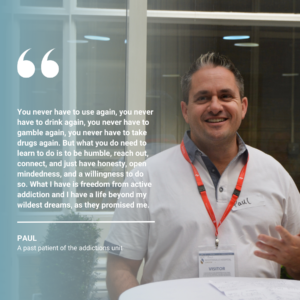
Funding addiction treatment
The cost of treatment varies according to the type of treatment and programme that you and your specialist decide is the best option for you. Outpatient appointments, day therapy, and inpatient treatments can be self-funded or paid for through private medical insurance.
Nightingale Hospital is accredited by all major private medical health insurers and works with many different medical insurance and medical assistance companies from all over the world.
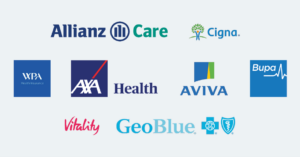
In addition, the hospital accepts patients funded by embassies, corporate organisations, management companies, and other third parties.
Next steps
All addiction treatment at Nightingale Hospital begins with a consultation with one of our addictions therapists or a consultant psychiatrist specialising in addiction.
Free telephone consultation
We offer a free telephone consultation to determine if addiction treatment would be right for you, or a loved one. Complete the form below and an addiction specialist will be in touch to arrange a telephone appointment.

